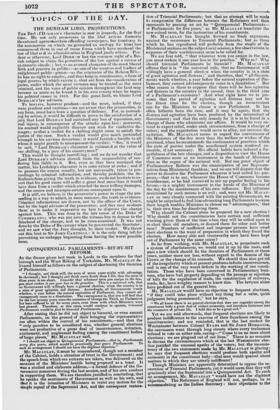TOPICS OF THE DAY.
THE DURHAM LIBEL PROSECUTIONS.
Tun Earl tf DURHAM'S character is now in jeopardy, for the first time. He not only perseveres in the libel acquits formerly threatened againstscertain offending newspapers, but (conti ary to Ike assumption on which we grounded an apology for him) has commenced them in one of those forms a hick have rendered the law of libel at d its administration in England justly Minus. Pru- dent or otherwise, Lord DURH has the common right of a Bri- tish subject to claim the protection of the law against a course of systematic slande. ; but, as an avowed champion of the most liberal faith and practice in politics.—as one of the creators and leaders of enlightened public epinion—as the originator of the Reform Bil- lie has no right to employ, and thus keep in countenance, a form of legal process by which TRUTH is shut out from the consideration of juries, under which the most virtuous may be treated as the most criminal, and the voice of publicc, opinion throughout the land may become as mute as he found it in his own county when he began his political career in 1813. For this great fault, we blame Lord DURHAM'S law advisers.
To lawyers, however prudent—and the more, indeed, if they
were prudent and cautious—we are aware that the prosecution, in any form, must have been a question of delicacy. For, in proceed- ing by action, it would be difficult to prove to the satisfaction of a jury that Lord DURHAM had sustained any loss of reputation, any real injury, in consequence of the attacks upon him : moreover, his counsel would explicitly disavow any wish for vindictive da- mages; so that a verdict for a shilling might seem to satisfy the justice of the case. Such a verdict would give much pretended triumph to his envious detractors: it would furnish a handle to all whom it might gratify to misrepresent the verdict: "See," it would be said, "Lord DURHAM'S character is estimatcd at the value of one shilling, by a jury of his countrymen !"
This would he thought mortif%inss; and we do not wonder that
Lord DURHAM'S advisers shrunk from the tesponsibility of ren- dering him liable to it. But, even as they have managed the matter, his Lordship's character is to some extent at stake ; and if he pursues the course usually, but not universally, taken in pro- ceedings by criminal information, and thereby prohibits the de- fendants from giving the truth in evidence, we do not hesitate to as- sert that his good name will suffer a great deal more than it would have done from a verdict which awarded the most trifling damages, and the sneers and misrepresentations consequent upon it.
It is still, we believe, in the prosecutor's power to shape the pro-
ceeding in a way to admit, in some measure, the truth in evidence. Criminal informations are drawn, not by the officer of the Court, bat by the legal advisers of the prosecutor; and they may so shape them as to make it imperative on him to disprove the charge against him. This was done in the late cause of the Duke of CUMBERLAND; who was put into the witness-box to depose to the falsehood of the charge, and to be cross-examined. It was not done by the Duke of BEAUFORT when he prosecuted the Spectator; and we saw what the Jury thought, by their verdict. We throw out this hint to Sir JOHN CAMPBELL: it is the only thing left for preventing an unhappy beginning from having the worst possible issue.


















 Previous page
Previous page